Sesame Street, Pakistan: Your Tax Dollars at Work
The Federal government is funding a Pakistan version of Sesame Street for $20 million.
You might have been under the impression that the U.S. Federal Government is broke. P’shaw.
Guardian (“Sesame Street comes to Pakistan“):
There’s no Cookie Monster, no Big Bird and no Count von Count.
But Pakistani children will soon start experiencing what millions in the west have done for more than four decades – the joys of Sesame Street.
In a $20m (£12m) remake of the classic American children’s programme, the setting for the show has moved from the streets of New York to a lively village in Pakistan with a roadside tea and snacks stall, known as a dhaba, some fancy houses with overhanging balconies along with simple dwellings, and residents hanging out on their verandas.
The Pakistani version, in which characters will speak mostly in Urdu, will feature Rani, a cute six-year-old Muppet, the child of a peasant farmer, with pigtails, flowers in her hair and a smart blue-and-white school uniform. Her curiosity and questions about the world will, it is hoped, make her a role model for Pakistani children.
The financing for the series comes from USAid, the economic assistance arm of the US government, which aims to help the country’s young learn some basic words and numbers through Sesame Street’s fun style of education. Pakistan’s schooling system is failing badly, a major reason for a descent into religious conservatism and economic stagnation.
Elmo, the cheerful monster toddler from the original, will be in the Pakistani version, with new local personality touches. But other American favourites such as Count von Count – a lovable vampire who would rather count telephone rings than answer the phone – will make way for local characters in SimSim Humara (“Ours”), the Pakistani edition.
No word on whether Pakistan Elmo is an essential employee and therefore exempt from the possible government shutdown. Is this an incredibly brazen waste of money? Or a drop in the bucket well spent? The second, quite likely:
“The idea is to prepare and inspire a child to go on the path of learning, and inspire the parents of the child to think that the child must be educated,” said Faizaan Peerzada, the chief operating officer at the Lahore-based Rafi Peer Theatre Workshop, which was awarded the commission for the project in collaboration with Sesame Workshop, the creator of the American show. “This is a very serious business, the education of the children of Pakistan at a critical time.”
The show will have strong female characters and carry an implicit message of tolerance but will feature no pro-American propaganda or overt challenge to hardline religious sentiment. Under Barack Obama, US civilian assistance to Pakistan has tripled to $1.5bn a year but the money does not seem to have made much obvious impact. The Pakistani Sesame Street could turn out to be the most visible American aid project in Pakistan in recent years.
I haven’t the foggiest whether a Pakistani Sesame Street will succeed in transforming the culture on matters of gender equality or literacy. But, given that we’re pouring hundreds of billions of dollars into the region, I’m willing to risk $20 million to find out.
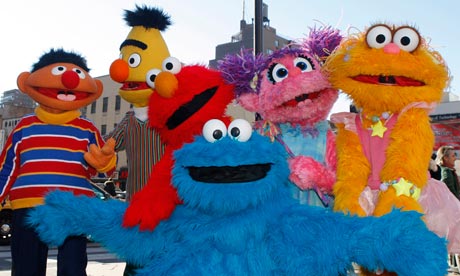

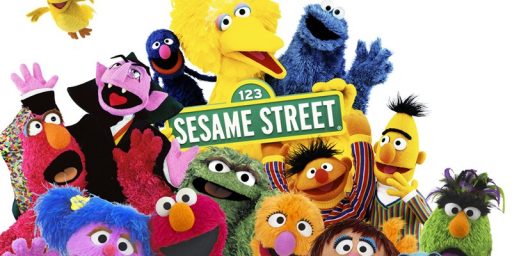
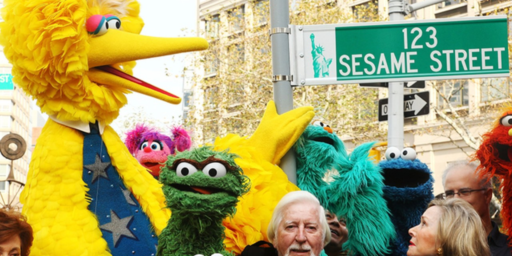
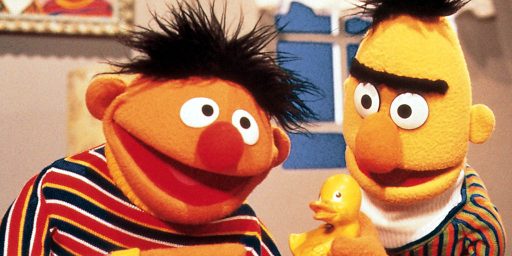
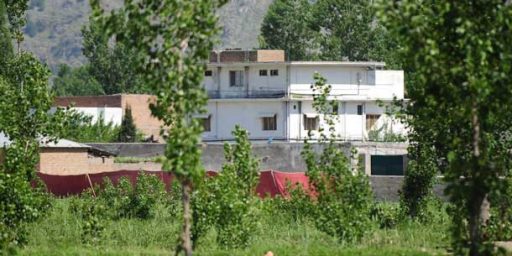

I wish this attitude was used more when it comes to foreign aid. I think a lot of foreign aid may indeed be wasteful–and we should be careful about how we spend it–but if certain types of foreign aid (like this) seem frivolous but just MIGHT do something to change attitudes toward America for the better…go for it.
I’d rather spend $20 million now on the chance it improves America’s image in that world, then a few hundred billion in 20 years combatting anti-american extremists.
http://www.discoverthenetworks.org/viewSubCategory.asp?id=713
I think it will become $20 million to promote hatred of the West.
Pew Report: Views of Pakistani Muslims in 2010
Opinions about “extremist” groups:
51% are at least somewhat worried about “extremist” groups taking control of Pakistan, down from 69% in 2009.
Pakistanis feel less threatened by the Taliban and much less by al Qaeda. Last year, 73% rated the Taliban a serious threat, compared with 54% now. Roughly six-in-ten (61%) considered al Qaeda a serious threat last year; now, just 38% feel this way.
Only 53% voice an unfavorable view of al Qaeda, down from 61% in 2009.
65% currently give a negative rating of the Taliban, down from 70% in 2009.
Just 35% have a negative view of Lashkar-e-Taiba, a Pakistani group active in Kashmir that has often attacked Indian targets (it is widely blamed for the November 2008 Mumbai terrorist attacks), while 25% express a positive assessment and 40% offer no opinion.
Roughly 20% approve of both Hezbollah and Hamas.
View of the US:
Only 17% have a favorable view of the U.S. 59% describe the U.S. as an enemy, while just 11% say it is a partner.
61% have a negative view of the American people, while just 18% express a positive opinion.
Only 8% of Pakistanis express confidence that Pres. Obama will do the right thing in world affairs.
The U.S.-led war in Afghanistan is widely opposed by Pakistanis. 65% want U.S. and NATO troops removed as soon as possible. Relatively few Pakistanis believe the situation in Afghanistan could have a serious impact on their country: 25% think it would be bad for Pakistan if the Taliban regained control of Afghanistan and 18% say it would be good; 27% think it would not matter and 30% have no opinion.
64% say it is important for relations with the U.S. to improve, up from 53% last year.
23% believe the U.S. provides a lot of financial aid, 22% say it provides a little aid, 10% say hardly any, and 16% believe the U.S. gives Pakistan no aid.
Widespread Support for Harsh Sharia Laws:
85% support segregation of men and women in the workplace
82% support stoning adulterers to death
82% support whippings and cutting off limbs for robbery/theft
76% support the death penalty for leaving Islam
20% support suicide bombings and violence against civilians
Support for gender segregation and for severe punishments is pervasive across all demographic and regional groups.
44% say there is a struggle between those who want to modernize their country and Islamic fundamentalists; just 12% see no struggle, and 44% do not offer an opinion.
61% who say there is a struggle between those who want to modernize Pakistan and Islamic fundamentalists also say they identify with the modernizers, down from 73% in 2009.
Majorities among those who identify with modernizers AND among those who side with Islamic fundamentalists in a struggle between the two groups endorse making harsh punishments the law in Pakistan. 88% of those who say they identify with Islamic fundamentalists favor the death penalty for people who leave the Muslim religion, compared with 67% of those who side with the modernizers. 88% of Muslims who side with fundamentalists and 85% of those who identify with modernizers say they favor the segregation of men and women in the workplace.
Islamic influence in politics:
42% prefer democracy to other types of government; 15% say that, in some circumstances, a non-democratic government can be preferable, and 21% say that, for someone like them, the kind of government their country has does not matter.
46% say Islam plays a very large or fairly large role, while 36% say the role of Islam in Pakistani politics is small. 88% of those who see Islam playing a large role say that is a good thing. Similarly, 79% of those who say Islam’s role is small say that is a bad thing for their country. This pattern is true across all demographic groups.
http://pewglobal.org/2010/07/29/concern-about-extremist-threat-slips-in-pakistan/1/